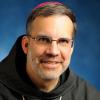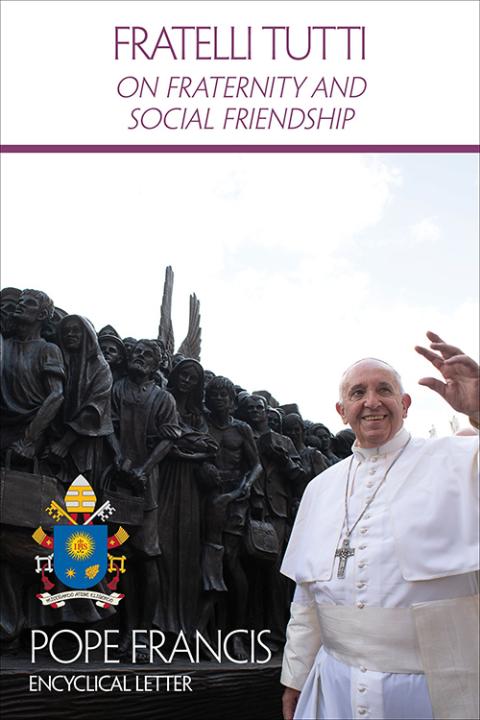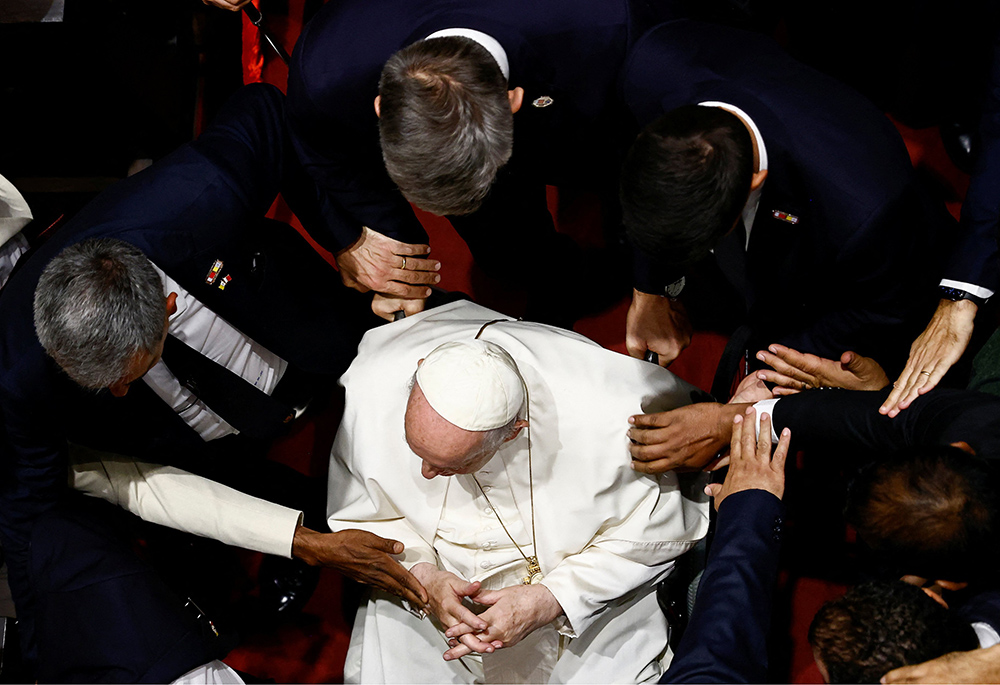
People reach out for Pope Francis during an ecumenical prayer service for peace Nov. 4, at Our Lady of Arabia Cathedral in Awali, Bahrain. (CNS/Reuters/Yara Nardi)
Editor's Note: Pax Christi International hosted a conference in Rome Dec. 5-7 in conjunction with the Justice, Peace and Integrity of Creation Commission of the Union of Superiors General/International Union of Superiors General with theologians, church officials and grassroots activists on the theme "Pope Francis, Nonviolence and the Fullness of Pacem in Terris." Bishop John Stowe addressed the event and gave NCR permission to publish his text.
We recently observed the 60th anniversary of the opening of the Second Vatican Council: a watershed event whose meaning, import and legacy is still a matter of contentious debate even as its fruits have been enjoyed for decades.
Setting aside the liturgical battles, the "letter vs. the spirit" and the resourcement and aggiornamento interpretations, Catholics across the globe have become more familiar with the word of God in sacred Scripture, have cherished "full, conscious and active participation" in the liturgy, have slowly recognized a need to be evangelizers, have appreciated the importance of a well-formed conscience, have engaged in deep dialogue with fellow Christians and other religious traditions, have rediscovered baptism as the foundational sacrament and enjoyed many other gifts that resulted from the council.
Each of these developments, from the restoration of the ancient kiss of peace in the Mass to elevated role of the laity, can be a doorway to renewing the priority of working for peace in the mission of the church.
The role of the church in the modern world was a key consideration of the council and obviously became the subject of the one of the council's major documents. The Second Vatican Council was celebrated not only with the eager attention and anticipation of the Christian world, but also within the living memory of the Second World War and the unspeakable horrors of the Holocaust — which, despite the many documented heroic acts by members of the church in resistance and in rescuing Jewish people, the church was largely ineffectual in stopping, and even inadvertently played a role in making it a possibility because of antisemitic strains in theology and practice.
Sixty years later, we witness not only differences in interpreting the Second Vatican Council, but also a dangerous rise in antisemitism; especially but not exclusively in the United States.
In this conference we are reflecting on the fulfillment of Pacem in Terris, a document which will be 60 years old next year and which expressed the centrality of genuine peace rooted in justice in the church's proclamation of the Gospel and its invitation to salvation in Christ. It is the same jolly, elderly and rotund pontiff who was expected to be a mere placeholder on the chair of Peter who bravely convoked the council and who gave us this foundational document for peacebuilding as the work of the church in our times.
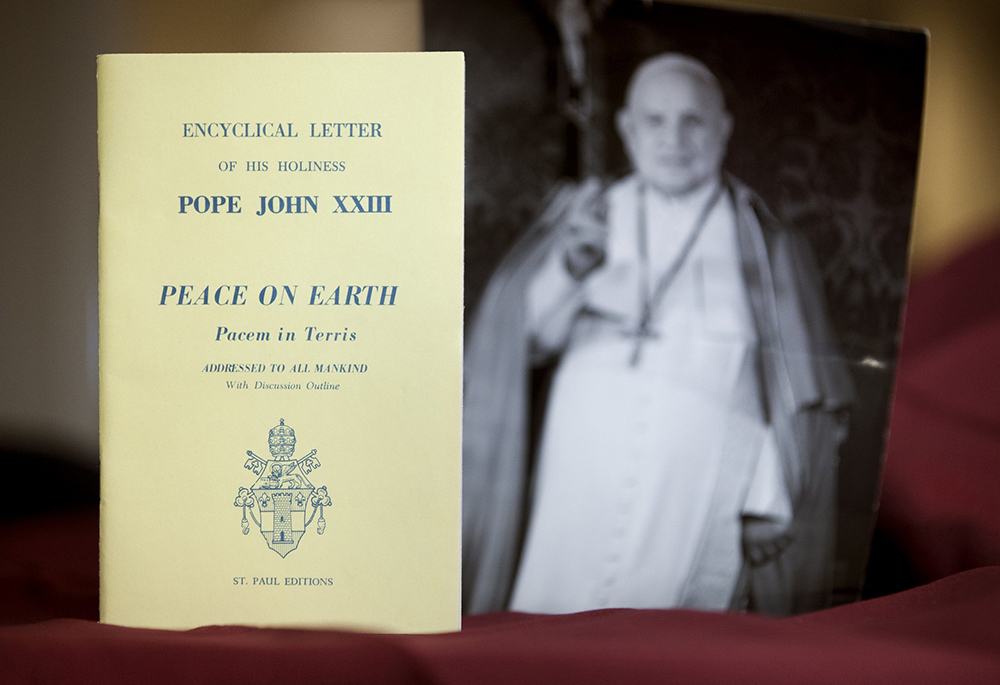
An early edition of the encyclical Pacem in Terris ("Peace on Earth") is pictured next to a photo of its author, Pope John XXIII. The landmark papal letter addressing universal human rights and relations between states was issued in 1963. (CNS/Nancy Wiechec)
St. John XXIII also spoke a fatherly and pastoral word to the children of God and to Christian families on the eve of the council's beginning in his famous moonlight speech over St. Peter's Square. Ten years ago, as the 50th anniversary of that speech was being recalled, I remember pondering the words, "When you go home, give your children a hug and tell them it is from the pope. And when you find them with tears to dry, give them a good word. Give anyone who suffers a word of comfort. Tell them, 'The pope is with us especially in our times of sadness.' "
I mused at that time, "Imagine having a pope who speaks like that!" And five months later, we did! We again have a pope whose smile has enchanted the whole world, whose actions and gestures speak even more loudly than his powerful words, and who is calling the church back to the fundamentals of the Gospel — or, as he puts it, the "joy of the Gospel."
Pope Francis has left no doubt that the Second Vatican Council has charted the course for the church and provided us with the appropriate image of a pilgrim people on the way to the kingdom. Like his smiling predecessor, Francis is attuned to the realities of the suffering of the innocent and painfully aware how the inequalities in access to and consumption of the world's goods have led to a disturbing lack of peace and the inability for humanity to live as sisters and brothers as God's plan has designed.
Advertisement
Since 2013 we have been warned about the "globalization of indifference," a phrase first used as Pope Francis lamented the world's lack of interest in boatloads of human beings from Africa drowning in the Mediterranean while the press paid more attention to falling points on the global market. He has denounced the Third World War being fought piecemeal as we can ever more painfully see happening before our eyes around the globe: from Ukraine to Uvalde, Texas, where racism and easy access to weapons have brought the fruits of war into a schoolhouse. Add Yemen, Myanmar, Afghanistan, Sudan and places where so many other conflicts are taking place and it appears that the pope's description is not hyperbole.
Not only has Pope Francis prayed incessantly for peace and called for peace throughout the war in Ukraine, he has brought warring factions from South Sudan into the Apostolic Palace and kissed their feet, pleading with them to work to end war and the suffering of their people caused by violence. He has tried again to initiate peace talks between Palestine and Israel and he has not been afraid to be present in places of conflict around the world as a promoter of peace. The pope has used the personal relations he has cultivated with Muslim leaders to invite them to join him in condemning religious violence and to highlight the peace which God desires for all his people.
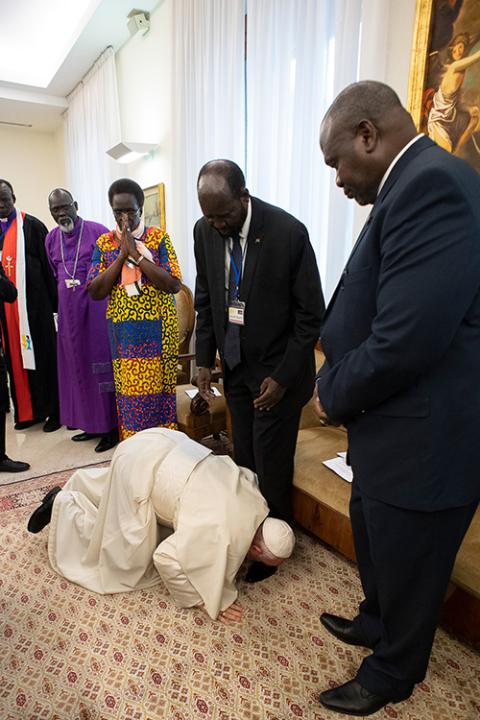
Pope Francis kisses the feet of South Sudan President Salva Kiir April 11, 2019, at the conclusion of a two-day retreat at the Vatican for African nation's political leaders. (CNS/Vatican Media via Reuters)
On the vigil of the feast of St. Francis in 2021, Pope Francis signed his encyclical Fratelli Tutti ("Brothers and Sisters All") at the tomb of the famous peacemaker whose writings gave rise to the name of the document. Together with the 2015 encyclical Laudato Si', this first Jesuit pope in history has given the global church a healthy dose of Franciscan spirituality: highlighting the interrelationship of all creation and the need to live as brothers and sisters, in fraternity with all humanity and indeed all of creation.
Written in the midst of the global coronavirus pandemic, in Fratelli Tutti Francis laments how humanity failed to come together to address this common threat to the whole population and he urges humanity to build the friendships and relationships that will be necessary to stop resorting to war and violence and that promote the need to work together to address the climate catastrophe currently accelerating.
Not only does he celebrate the interrelationship of all creation and of the whole human family, but as in all of his apostolic exhortations and magisterial teachings, he elaborates on the interrelationship of all the issues that threaten human existence, human dignity and human life today. Climate change disproportionately affects the poorer countries of the world who consume less of the fossil fuels which have caused the warming. The loss of islands, the destruction of land and biodiversity, the unusual and brutal weather patterns lead to greater migration, while the wealthier nations too often close their doors to the suffering migrants trying to preserve their lives — all of this is a form of violence.
Why should the pope be the only one who sees the unsustainability of the present situation? Are we unaccustomed to having prophets arise from within the church's hierarchy? Are human beings today so suspicious of any kind of organization, that the common good becomes unthinkable? What will it take for all of the leadership of the church and of other world religious to speak as forcefully for the need for structural change and allow human values to supersede economic values?
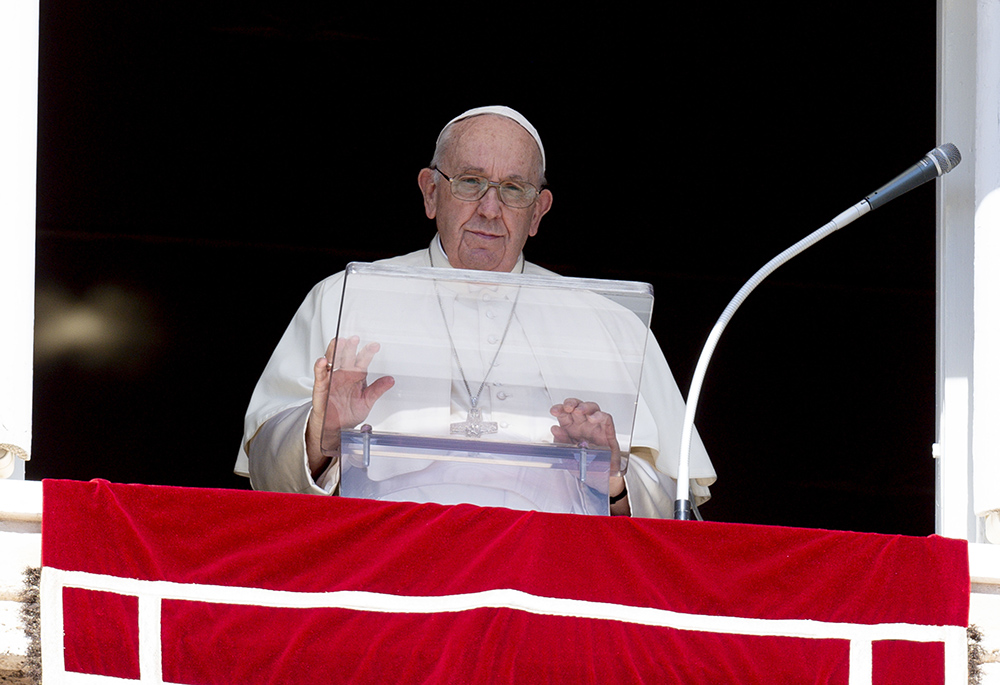
Pope Francis leads the Angelus from the window of his studio overlooking St. Peter's Square Oct. 2 at the Vatican. The pope begged Russian President Vladimir Putin to stop the war in Ukraine and condemned Russia's annexation of four Ukrainian regions. He also called upon Ukrainian President Volodymyr Zelenskyy to be open to serious peace proposals. (CNS/Vatican Media)
It is commonly accepted that Pope Francis was elected by the cardinals primarily to reform the Roman Curia. We have recently seen the structure that is setting the form for that renewal: a Curia that is centered on evangelization (as its name, "Preach the Gospel" makes clear) and that gives high importance to integral human development, after nearly a decade of his pontificate.
But from the very evening that he stepped forth on the balcony of St. Peter's and was introduced with the name Francis, my heart leaped like those of so many Franciscan sisters and brothers who heard an echo of the Lord's words to Francis of Assisi — "rebuild my church." This Francis was concerned with not only reforming an organization bureaucracy, but in reforming a church by using its founding document, the good news of our Lord Jesus Christ.
Drawing on all his experience as a Jesuit schooled in discernment and as a pastor who led his people to a relationship with Jesus Christ, Francis knew where to begin. He started his universal ministry as a pastor, from the first Sunday Mass that he celebrated at St. Anne's Parish church in the Vatican where he shook hands with people as they left the church, he has made personal and real the nearness of Christ, witnessing an all-inclusive love that affirms human dignity in everyone he encounters.
Noting that the world's attention was on him, he deflected that attention to the peripheries — to the places that the world would rather not notice: the island of Lampedusa where the shipwrecks of refugees occurred, to a slum in Rio de Janeiro considered too dangerous to visit, to a silent prayer at the wall that separates and imprisons Palestinians in the Holy Land, to migrant and refugee camps, to prisons at home and abroad, to homeless shelters and soup kitchens, to Native American reservations where he begged forgiveness for unspeakable abuses — the list continues right up to this moment.
Being the first Latin American pope, Francis also brings the legacy of CELAM, the regional episcopal conference of Latin America that transformed the church from an institution allied with the powerful to the preferential option for the poor, to the universal church — the priority of the poor is something that is essential in Pope Francis' ecclesiology. In his very person, Francis brings the periphery of the church to the center.
Given the joyful encounter with Christ which Francis radiates everywhere, along with his attention to human dignity and his insistence that Christ is to be encountered on the peripheries with the people considered disposable, it is altogether consistent that this pope would declare the death penalty to be inadmissible in today's world and who has reopened the question of whether any war can be just in today's circumstances.
This pope has initiated a global dialogue within the church and has been a constant advocate for dialogue beyond the church. He finds the importance of this in the witness of Jesus who ate and drank with sinners, prostitutes and tax collectors and who revealed his Father's love, which like the sun and the rain, fall on the good and bad alike.
In Fratelli Tutti, Pope Francis insists on the difference between forgiving and forgetting, calling the former always possible even if exceedingly difficult and the latter unadvisable, because we must always learn from our history. No lasting peace can be fashioned without reconciliation, and reconciliation is a process — a painstaking process that will have setbacks but is vitally important to restoring the peace that God desires. A process that begins with restoration and a sincere acknowledgement of harm that was done so that healing may begin. Something that the U.S. has yet to learn, especially regarding the consequences of slavery and our treatment of Native Americans.
Pope Francis has called for a missionary conversion in the church, prioritizing mission over maintenance and not permitting the status quo in our parishes, dioceses and institutions when the need for spreading the Gospel and the peace that is promised therein is pressing and the need for humanity to come together as one is urgent. In the farewell discourse of Jesus in John's Gospel, he promises a peace that the world cannot give, a peace for which we pray in every eucharistic celebration before expressing physically our desire to be at peace with all.
The Holy Father is teaching us that the peace which the world cannot give will not be produced by technology or science, not even the best diplomacy, but by recognizing the dignity of the human person and the global fraternity that we are called to live. It is when we become neighbor to the other who is different than me, as the good Samaritan did, that we foster the peace that the world cannot give.
It is my hope that participation in this conference will help us all to realize with ever greater conviction that nonviolence is not a passive stance towards the evil in the world, but a faith-filled stance that death and sin have been conquered in Christ's resurrection and that the risen Christ's gift of peace begins with the power to forgive.
Our prophetic pope is calling us to witness that kind of reconciliation, focused on human dignity and the interrelationship of all creation, that will make it truly possible to beat swords into plowshares and spears into pruning hooks and where lion and lamb can lie down together in peace.
